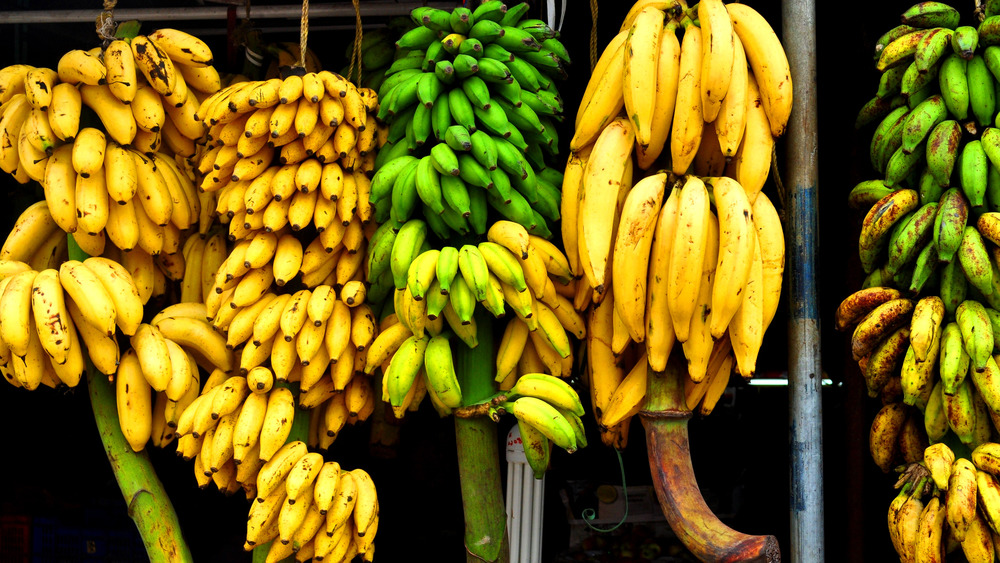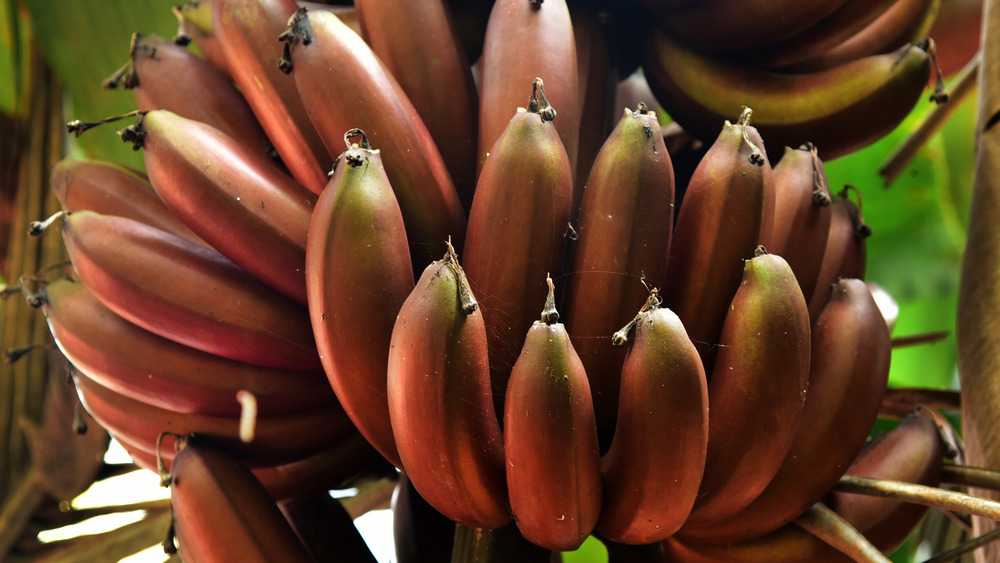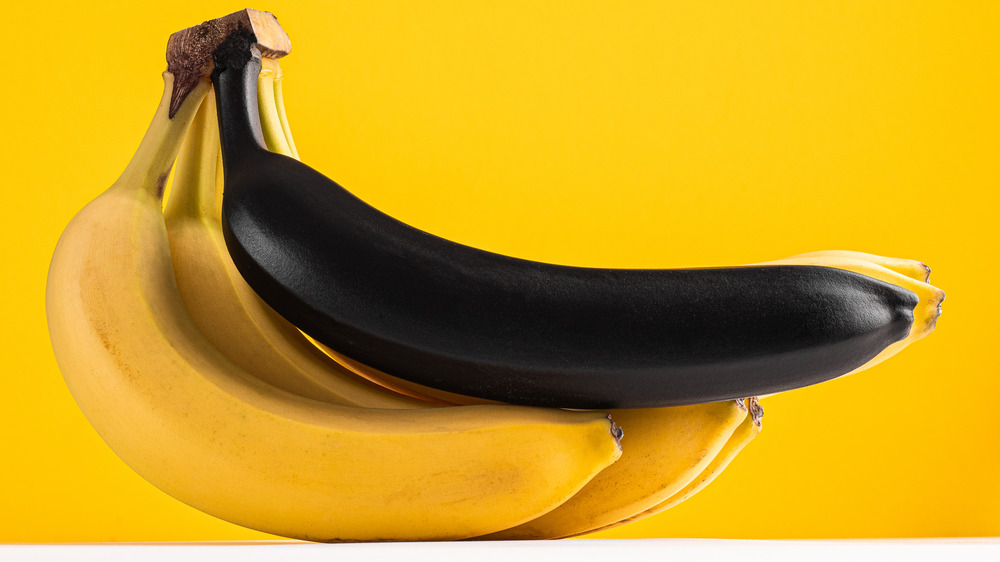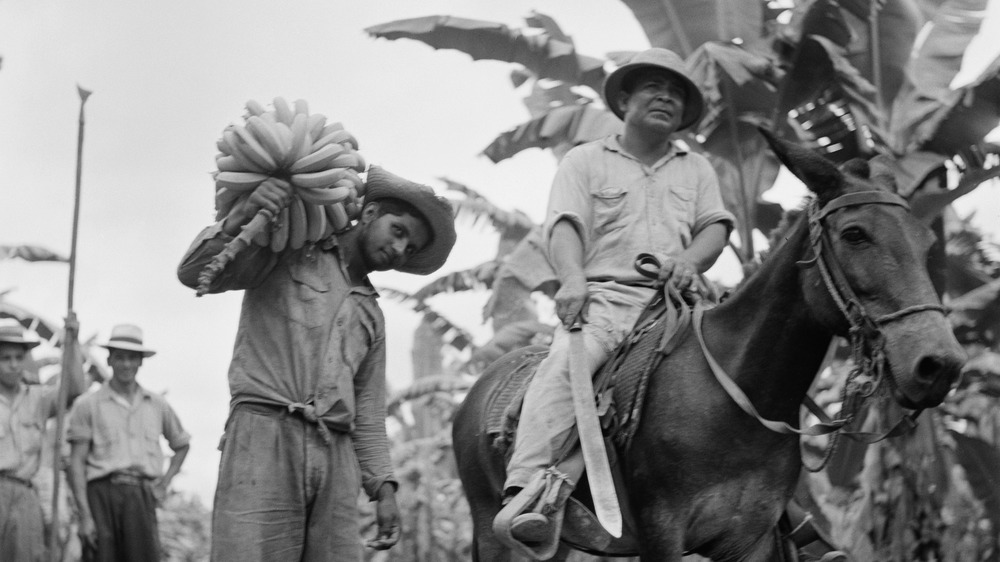The Surprisingly Dark History Of Bananas
Although bananas are technically berries, it's easy to see them as the apple of mankind's eye. In a 2019 survey, bananas edged out apples as the fruit most consumed by Americans (via Statista). Roughly 115.7 million metric tons of bananas are grown globally every year, per WorldAtlas, making them second only to tomatoes in terms of sheer tonnage produced. Yellow like the sun and crescent-shaped like the moon, bananas are among the brightest stars of the fruit world. But while this might sound like the start of a culinary love letter, a pen can be a double-edged sword, and humanity's love of bananas cuts both ways.
For instance, in the hands of Nata Mullick, bananas weren't a way to brighten lives but rather to cut them short. A hangman in Calcutta, India, Mullick gained acclaim in 2004 after executing an infamous criminal. He told the press that he used mashed bananas to help lubricate nooses and gave tips on tying "a good" one (via BBC News). Sadly, children paid attention and ended up strangling family members and friends. But the banana's grim associations go far beyond the tools of executioners.
During the early 20th century, the jubilant-looking fruit was characterized as a "weapon of conquest" when wielded by the United States against Latin America, according to The New York Times. It's tied to a lengthy string of horrific behaviors and events across history. We don't mean to spoil the banana's good name, but even that name has rotten roots.
Fruits of conflict
Before the banana was a weapon of conquest, it was a spoil of war. As described by Britannica, around 327 BCE, Macedonian ruler and self-ordained god-king Alexander the Great sicced his army on India. (Interestingly, the tactics Alexander employed – dislodging enemy tent stakes on horseback and possibly stabbing war elephants' feet – may have inspired the lethal sport of tent pegging.) While raining carnage on India, he's thought to have stumbled across bananas, per the University of Illinois Urbana-Champaign. He enjoyed them for dessert, writes UN News, and became enamored enough to take bananas to the Western world.
Alexander's invasion kicked off a great migration, as the banana made its way to the Middle East, where it eventually caught the eye of Arabian slave traders, who may have given it its name. As the theory goes, since the fruit originally grew as large as a human finger, slave traders dubbed it a "banan," the Arabic word for "finger." Around the 1st century BCE or later, Arab and Indian ships carrying bananas and spices showed up on East Africa's shores. The new arrivals began taking slaves, ivory, and gold, per PBS station Thirteen. East Africa would become the epicenter of a devastating slave trade run by Muslim Arabs. It robbed millions of their freedom and ravaged the region for hundreds of years (via Deutsche Welle). Scientific evidence suggests that three-quarters of the slaves died of starvation, exhaustion or illness during arduous journeys to the slave market.
The ugly side of the banana's a-peel
As the slave trade metastasized across Africa, bananas spread to the West African island of Guinea, where Portuguese sailors first encountered the fruit in 1402. They in turn introduced it to the Canary Islands, where bananas are now the top crop (via FreshPlaza). In 1516, bananas debuted in the Caribbean, brought by the Portuguese monk Friar Tomas de Berlanga. From the mid-1520s to the mid-1860s, as many as 12.5 million enslaved Africans arrived in the Caribbean, South America, and North America, according to PBS.
The University of California, Santa Cruz observes that early on, bananas in the New World were usually used on plantations to provide shade for more lucrative crops. They further served as a low-cost, high-calorie fuel source for slaves laboring in hellish conditions. Adding insult to historical injury, bananas later became a racist taunt against black people. In the U.S., the association was etched in celluloid by the 1915 film, Birth of A Nation. Speaking with the BBC, University of Central Lancashire Professor Alan Rice highlighted a scene in which black South Carolina legislators were depicted "as certain bestial simians eating fried chicken and bananas, leering at white women in the galleries."
In Europe during the 1970s and '80s, soccer fans heckled black players by throwing banana peels at them (via NBC). Such indignities didn't disappear completely in the decades since. In 2014, a youth soccer coach in Spain lobbed a banana at a black Brazilian player, per NPR.
Banana repugnant
Many people know O. Henry for writing "The Gift of the Magi," but his literary gifts also gave us the term "banana republic." As detailed by History and Smithsonian magazine, O. Henry first used "banana republic" in his 1904 short story, "The Amiral," which was inspired by his time as a fugitive in Honduras. On the lam after embezzling money from a Texas bank, he witnessed U.S. fruit companies plundering a country to grow bananas more cheaply in Latin America.
The Cuyamel Fruit Company birthed the first banana republic. Founder Samuel Zemurray had entrenched himself in Honduran politics and exerted influence ruthlessly. His company even armed the participants in a 1911 coup that installed a new president. Zemurray later helmed the United Fruit Company, known in its current incarnation as Chiquita. Derisively dubbed the "the octopus" (via WBUR), United Fruit used its tentacles to lock Guatemala, Colombia, and Honduras in a stranglehold.
Modern Farmer writes that in 1928, Colombian banana workers went on strike to demand 6-day workweeks, access to medical care, an actual contract with the company, and to receive money instead of scrips that had to be spent at United Fruit-owned stores. Fearing that the U.S. would intervene, the Colombian government deployed 300 soldiers. A massacre ensued as troops gunned down banana workers.
United Fruit flexed its muscles again in 1954, teaming up with the CIA to topple Guatemala's government. As Chiquita, the company would pay a $25 million fine after admitting to funding a Colombian death squad for a decade (via Courthouse News).



